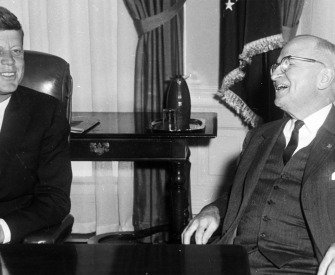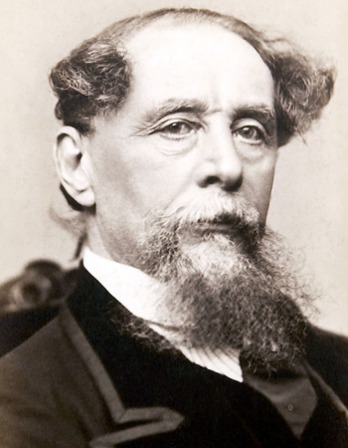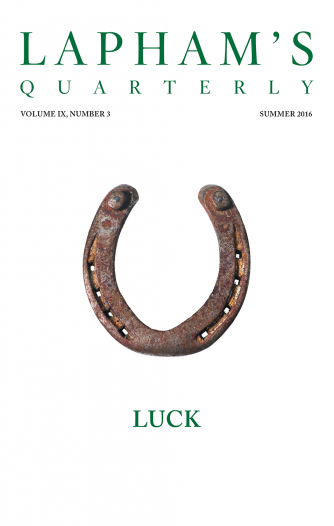One of the things men should most strive to do is win a good reputation and see that no one questions it.
—Juan Manuel, 1335
Krewe du Vieux float satirizing Louisiana politicians with legal problems, including former governor Edwin Edwards (second from right) and notorious state representative David Duke (second from left), both in prison at the time, 2003. Photograph by Infrogmation. Wikimedia Commons (CC BY-SA 2.5).
You don’t always—or often—get to hear the whole story in a courtroom. The law is like pouring batter into a mold. The mold is the law but not necessarily the truth. Decades ago I covered the corruption trial of Louisiana governor Edwin Edwards (not to be confused with current governor John Bel Edwards, to whom he bears no resemblance). The trial was conducted in my hometown, New Orleans, which I had even then long since escaped. Sometimes it is more daring to stay home than to go out into the world. I always felt that way when it came to New Orleans. Yet many of my childhood friends returned there for practical reasons. Things didn’t work out, so they went home, where they knew they’d have their mother down the street and the support of their family. The next thing you know, you’re visiting your mother daily, materializing out of a dark hall, your remarks soaked in sarcasm, like in a Tennessee Williams play.
Louisiana had a history of megalomaniac politicians, some power-crazed, like Huey Long, and others just crazy, like his brother Earl Long. The latter made rambling and quixotic trips to the grocery store involving purchases that filled five state limousines when he was governor. When he went to the store, he didn’t just buy one cantaloupe, he bought forty-four cases of cantaloupes. Perhaps today they’d call that OCD, or even Tourette’s—an involuntary urge to buy cantaloupes—and it’s not illegal, it’s just bizarre. But is that a scandal? No, it’s a personality peccadillo, or a psychological disorder—duly depositing him in the state mental hospital at various junctures.
I could never in my heart condemn the governor whose trial I covered. Neither could the populace, for he was elected to another term after the trial—serving an unprecedented four terms in total. Just as one might have to feel a ray of pity in one’s heart for Earl Long and his quest for cantaloupes, or for the New Orleans mayoral candidate of my youth who ran on a perennial platform to outlaw exploding cigars, I was bemused by these curious public foibles and made no distinction between the antic and the crime. In fact, those seem more innocent days. Yet it was I who was innocent.
The governor was a wily Cajun with a lot of personality, a country boy but suave. The familiar theory at the trial was that the people of Louisiana would rather be entertained than served with ethics. Some would call this a Gallic attitude, to be blinded by charm at the expense of integrity, and indeed the culture of Louisiana is historically French Catholic. And as the Catholics might say, the fall from grace is inevitable, a mystery to be endured rather than a problem to be solved. And some in Louisiana would prefer a smart crook to an unintelligent opportunist masked as a crusader whose ambition blinds him to his own stupidity. Such a one could be just as dangerous, if not more so, than a crook.
It’s one thing to be a straightforward crook who skims the coffers. Everyone used to be a crook. That was how we understood the world, like in a Frank Capra movie. Or maybe that was the attitude at the governor’s trial—what else would you expect? Maybe the recent list of corrupt officials in Louisiana is long, but I’m sure it’s no longer than the list of corrupt politicians in Washington, DC. So let’s just use Louisiana as a microcosm for what is ubiquitous—and I must note my compunction in using my home state as a microcosm for what is ubiquitous.
Three of the past four Louisiana insurance commissioners have been incarcerated, and the New Orleans Police Department’s former director of child-abuse investigations keeps going back to prison for pedophilia. The Louisiana secretary of state was forced to resign in 2018 because of a lawsuit filed by a woman who worked in his office, where she spent ten years rebuffing his advances. According to the grand old man of scandal reporting in New Orleans, James Gill, “one of the more pathetic tales she told on her besotted admirer had him discovered by a neighbor at eleven pm one night sitting in her backyard wearing pajamas.”
Stories like that are a dime a dozen in the welter of humanity—it’s like a Hieronymus Bosch painting—though there may be a touch of innocence in the image of the besotted secretary of state in his pajamas, casting him in a slightly higher circle of Dante’s Inferno. Though I admit it’s either pitiable or disgusting, depending on your level of Gallic tolerance. To me the pathos only makes it more pathetic. It is why I sometimes fall prey to pitying jerks. Because they didn’t ask the Lord to make them a jerk, or to make them a pervert, or to make them pathetic, but they have to endure going through life that way. They are incapable of the government of the passions, as Dr. Johnson would say. And even if they were capable of it, they don’t know about it—that governing your passions is an option or should be the route taken at the fork in the road.
When I first moved to Washington, I attended a party at Blair House, which stands across Lafayette Square from the White House. Visiting dignitaries are often put up there. A tour was led by the chief of protocol, a fragile southerner obsessed with discretion who kept vowing never to write a book about the scandals he had seen, which he kept referring to in a veiled way. The history of the house was poignant. There was the room where Robert E. Lee was offered by Lincoln the command of the Union army, and where he refused it. There was the room where the chandelier almost fell on the king of Morocco right after he got out of bed. The decor was pretty much that of an old genteel country club that has seen better days. The chief of protocol kept picking up vases and saying, “This is from the Ming dynasty, but feel free to hold it”—and practically throwing it at you. The atmosphere was curiously unpretentious.
I imagined this must be a vestige of the original character and ideals of the capital. For example, one endearing thing about the father of our country was his propensity for self-effacement. Every time they drew him to a post, he would agonize and ultimately accept but essentially stand up and say, “I just want it on the record that I do not consider myself equal to this task.”
That was his basic position on everything. Showing that even the great have self-doubt. Maybe only the great. His professions of unworthiness continued to the end. In his farewell address to the nation after serving two terms as president he said he hoped that his many forms of incompetence would be consigned to oblivion.
It sometimes seems a cliché to commend George Washington, but “intellectual humility” is associated with the capacity to maintain convictions, according to a recent scientific study, and I think it is one quality that must characterize an incorruptible man. If only because such a man is capable of admitting his mistakes. He knows he is fallible, and his self-doubt expands the potential of his mind, allowing him to understand that there are better ways than his, and that they can and must be searched for.
But to return to Louisiana. Scandal is not endemic to Louisiana. It’s more of an epidemic, I have to admit, after looking into it. Even the most upright succumb. Once elected officials take office in Louisiana, they seem to go to pieces after about two years, as if infected by some contagion. After two years the automatic-scandal lever is activated. Auto-scandal is the default mode.
Ray Nagin, for example, a former mayor of New Orleans, started his term with a crusade to round up a ring of crooked Louisiana brake-tag inspectors, a quest which may sound paltry but which everyone was incredibly excited about. They were also excited about his global crusade against corruption in general. It was like that for about two years. Then he caught the corruption disease and was indicted for twenty federal felonies, some of which were conducted in direct benefit to his family members. Some say Katrina was what pushed him over the edge. His defense on the witness stand, delivered with a (Gallic?) shrug: “It was post-Katrina.”
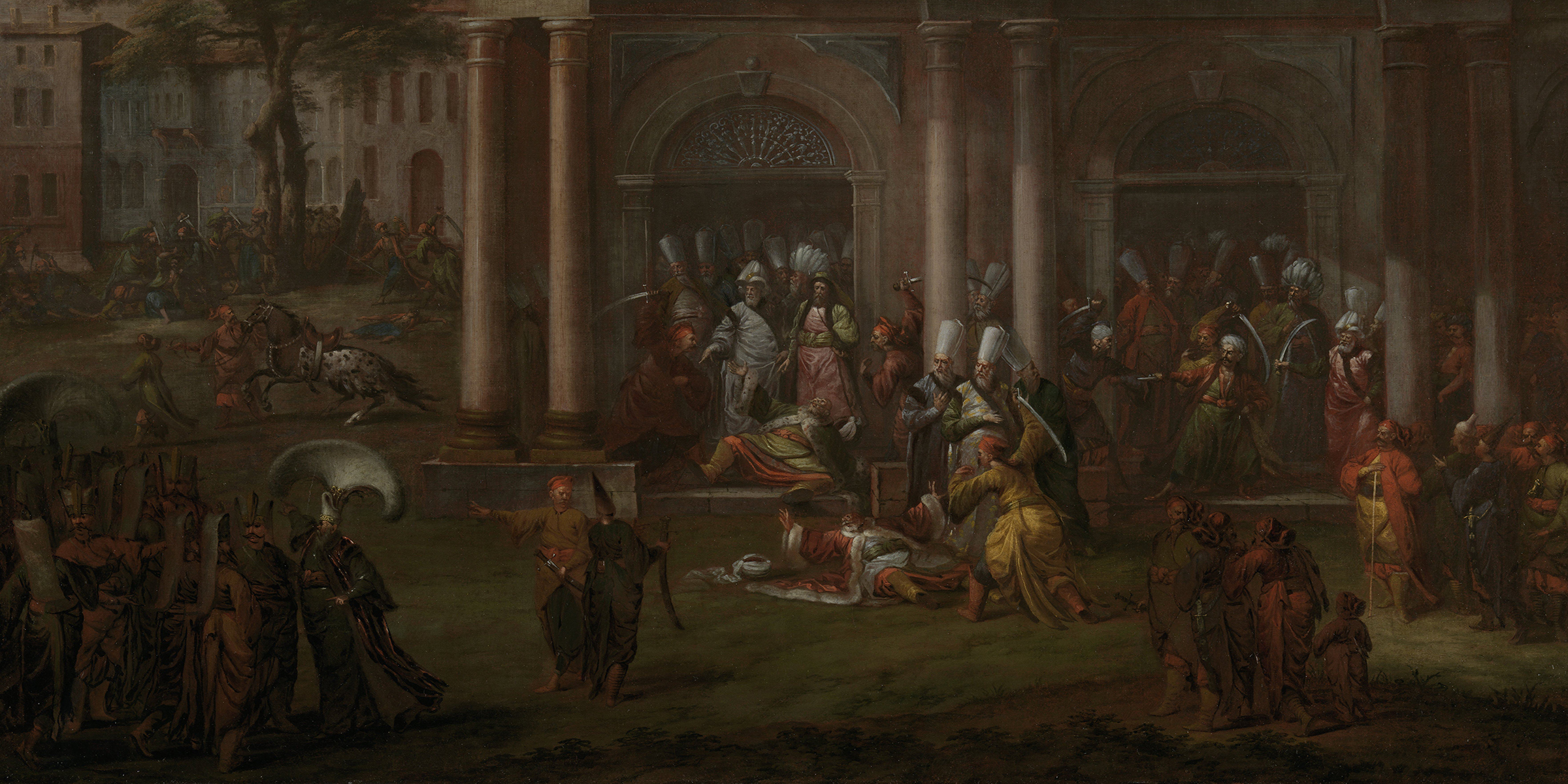
The Murder of Patrona Halil and His Fellow Rebels, by Jean Baptiste Vanmour, c. 1730. Rijksmuseum.
Former New Orleans city councilman Oliver Thomas was a beloved figure from the Ninth Ward who later pleaded guilty to taking bribes. Thomas said he was heartbroken. He did not know he was capable of taking bribes, he searched his soul in shock—like Napoleon brooding incessantly about the defeat at Waterloo, why it had happened, how he could have circumvented it, what went wrong, obsessively. Bob Livingston, an upright Republican congressman from Louisiana, resigned following revelations of multiple extramarital affairs. Maybe we can extrapolate here and suggest that the drive toward committing a federal felony while you are in office is as strong and biological and inchoate as the male sex drive.
Begging the question: Is there such a thing as an incorruptible man? I sometimes ask myself, What percentage of men would and what percentage of men wouldn’t succumb to temptation? 50-50? 60-40? 80-20?
But down these mean streets, a man must go who is not himself mean, who is neither tarnished nor afraid…a man of honor—by instinct, by inevitability, without thought of it, and certainly without saying it…Raymond Chandler understood the rarity of such a man.
Curiously, the special agent in charge of the FBI’s New Orleans division for some years, a Yankee from Boston, James Bernazzani, was the one who brought the charges against Oliver Thomas and William Jefferson (a promising congressman who did not seem cut in the scoundrel mold until they found 90K stashed in his freezer), among others. “In Louisiana they skim the cream, steal the milk, hijack the bottle, and look for the cow,” said Bernazzani—who was later removed from his post by the FBI after he suggested publicly in New Orleans that he might run for mayor, perhaps fueled by a megalomaniacal quest to clean up the mean streets.
Transcending the world of tawdry shenanigans, there is a more apocalyptic level of scandal, one that differentiates New Orleans from Washington, DC. In Washington it’s not about a crumbling nonfunctional infrastructure. The Sewerage and Water Board of New Orleans has been overwhelmed for the past hundred years: neighborhood streets flood routinely, people have broken pipes gushing water down the street like rapids, their calls to the Sewerage and Water Board go unanswered, their problems unaddressed amid what feels like a sea of lackadaisical apathy borne of insurmountable odds.
Author John Barry was on the levee board in New Orleans until he was kicked off after his perhaps overly idealistic and ambitious plan to litigate the oil industry for coastal erosion and sue ninety-seven oil companies was shelved. The results could have actually paid to restore the wetlands, which would take $100 billion—and we were then $90 billion short. It seems obvious that other members of the levee board and associated businessmen—and maybe the judge who was determined to kill the lawsuits as well—were unwilling to be adversarial toward their personal and Louisiana’s historical source of profit, the hinge on which the Louisiana economy hangs—the oil industry.
The Army Corps of Engineers—corrupt or incompetent? Likely a mixture of both, distilled into a fine cognac of scandal. Assessment of the corps’ levee maintenance has been “minimally acceptable” every year since Katrina. A former employee describes the corps’ office as disorganized and egocentric. As James Gill wrote in June 2018, “Hoopla aside, does anyone really trust New Orleans’ new ‘flood defense system’?” Maybe they’re all trying as hard as they can, but the aptitude the Netherlands has displayed for solving the crisis of flooding is inaccessible to the tropical mind.
Revelry was always a serious matter in New Orleans. Revelry is a sort of civic duty, a personality of the town intricately engraved since the first crew of convicts and undesirables were rounded up on the streets of France in the eighteenth century to colonize it. Maybe the Army Corps of Engineers are at nightclubs instead of out on the levees.
It may have been somewhat outlandish to build a large city on low-lying swampland besieged by tropical heat in the path of frequent hurricanes, but it was in a strategic location for a port that through the twentieth century contributed to the prosperity, renown, and worldliness of the city. Living in what most of its inhabitants never really perceived as a desolate and dangerous place only proved the depth of the attachment it inspired and added to its glamour. Isolation vastly enhanced its individuality. In that atmosphere of isolation, a lot of things have time to develop. A lot of personality, a lot of talent. Some desperation.
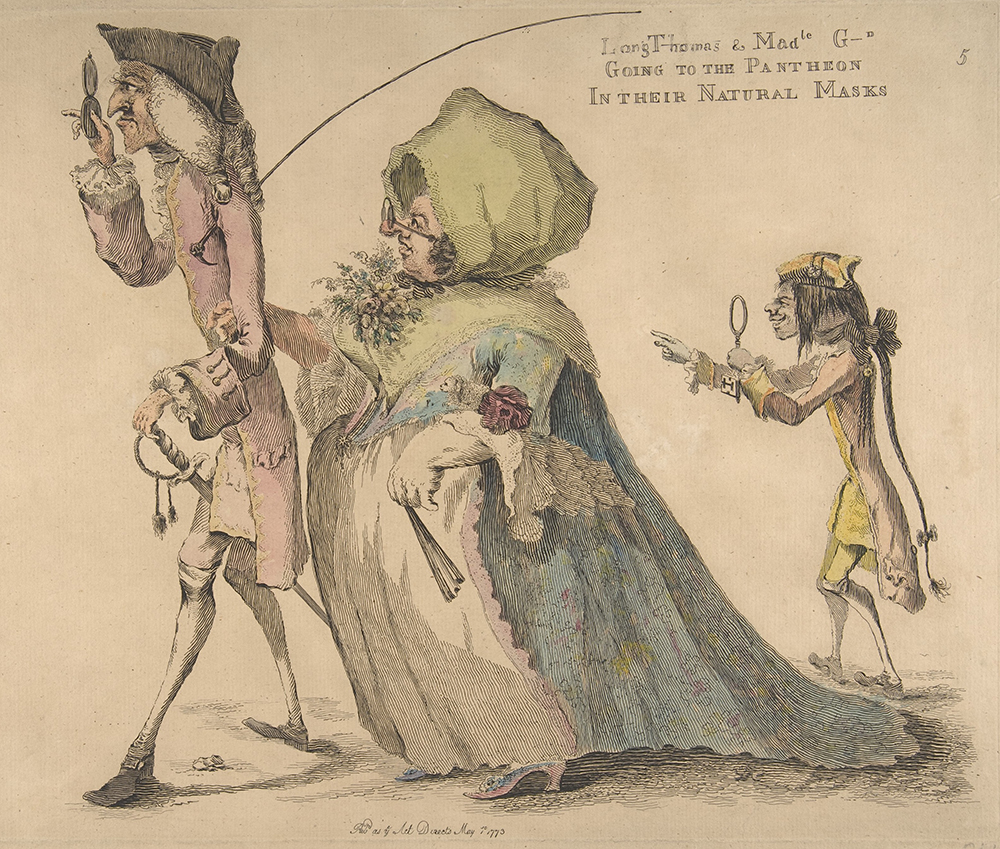
Long Thomas and Mademoiselle G–d Going to the Pantheon in Their Natural Masks, by William Austin, 1773. The Metropolitan Museum of Art, Harris Brisbane Dick Fund, 1917.
There was one main difference between my childhood there and my own kids’ childhoods in a suburban glen of Washington. My own kids were just regular people on a regular street in an American town, and the town was Norman Rockwell meets American ambition, sort of. It had a lot of cheery white-haired people who were amazingly cheerful on a frequent basis. What did they have to be so cheerful about? Well, for starters, they did not live in a crumbling, remote remnant of some strange and antique empire. For another, they had a lot of rules and regulations. This kept things viable. It kept them functional.
The rules in New Orleans were unspoken. They did not involve ambition or equality or regulation. They were based on a social order. It was a place where your father lived in the house he was born in and was downtown all day with the cronies he had known since nursery school and whose fathers had known each other since ditto. There was this vast atmosphere of solidity and the past. And that world is still there. There is the decline, but not the fall. It was also a place where you would see in some parts of town unimaginable squalor and decay and poverty—an apocalyptic level of scandal.
The transgressions of the governors and the politicians seem paltry compared to the magnitude of that scandal, of the historically sinned against, which is the heritage possessed by the South.
So the levels of scandal parallel the different circles of hell in Dante’s Inferno. The prurient and the petty occupy one level. Another level is for the indifference of those on top to those on the bottom. The cowards in the vestibule of hell, Dante calls them, though they’re in the highest circle—the corridor right outside of Purgatory. Yet the shambles they leave behind is of a magnitude that stacks the odds against the good to overcome. Is it the inevitable evil to be endured? Some people are bad. How can you change them? Is there any way but by the individual conscience?
You may be in a dark wood where the straight way is lost. You choose the route from there. You can loiter with the cowards in the vestibule of hell, or you can journey down another road and find a way out of this wilderness.
Otherwise there will be a scandal.
